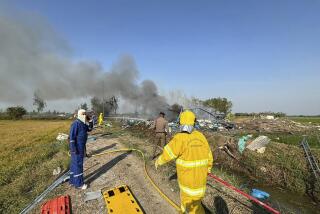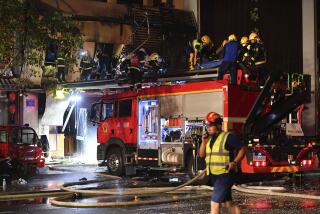12 killed in China’s latest industrial accident
- Share via
Reporting from Beijing — A powerful explosion caused by a broken gas pipeline killed at least 12 people Wednesday, injured about 300 and flattened hundreds of buildings in eastern China in the latest in a series of troubling industrial accidents.
The blast occurred at 10:15 a.m. Wednesday at a plastics factory in Nanjing, the capital of Jiangsu province. State news media reported that the explosion occurred when workers at the factory dug into a nearby propylene pipeline. The blast was so strong that many residents mistook it for an earthquake.
Almost all structures within 100 yards of the blast in the residential area of Qixia district collapsed, many of them old single-story homes marked for demolition. Several two- and three-story buildings also collapsed.
The accident was the latest to raise concern about industrial safety in China. An explosion this month at the northeastern port of Dalian caused one of the largest oil spills in the country. An acid leak at a gold and copper mine in Fujian province poisoned a nearby river, killing 2,000 tons of fish.
FOR THE RECORD: An earlier version of this article incorrectly stated that a polyethylene pipeline was punctured. It was a propylene pipeline. The article also incorrectly stated that Dalian is in northwestern China. It is in northeastern China.
“These accidents are not unpredictable but, rather, are the inevitable consequence of inadequate transparency and weak enforcement” of safety standards, said Alex Wang, senior attorney in the Beijing office of the Natural Resources Defense Council.
Also late Wednesday, officials in the northeastern city of Jilin revealed that 7,000 barrels of chemicals had washed into the Songhua River during heavy rains. About 3,000 barrels were reported to contain a flammable chemical used to make rubber and adhesives. Drinking water in parts of Jilin, a city of 4.5 million, was cut off as a result of the accident.
The pipeline blast Wednesday filled Nanjing with black smoke. Witnesses near the site of the accident said streets were covered with broken glass and blood.
Hospitals in Nanjing said their blood supply was running out and reportedly set up blood-donation sites at shopping centers around the city.
Soon after the explosion, officials moved to downplay the incident and control the reporting. In one scene, Ye Hao, a Nanjing official, was caught on camera yelling at a television correspondent who was attempting to film the fire.
“Who said you could broadcast it live?” Ye says in the video, shown widely on Chinese websites, though by the end of the day, it had been ordered removed from most of the sites.
Video of the area where the blast occurred showed charred cars and buses and gray rubble where houses once stood. Injured people lingered outside the cordoned-off area, many of them looking for family members and friends.
Chen Jia, a 19-year-old who works at a seafood restaurant about 500 yards from the factory, said the force of the blast broke all of the restaurant’s windows and injured 10 people.
“It’s still a mess out there,” Chen said Wednesday afternoon.
Kuo is with The Times’ Beijing Bureau. Tommy Yang of the bureau contributed to this report.
More to Read
Sign up for Essential California
The most important California stories and recommendations in your inbox every morning.
You may occasionally receive promotional content from the Los Angeles Times.












